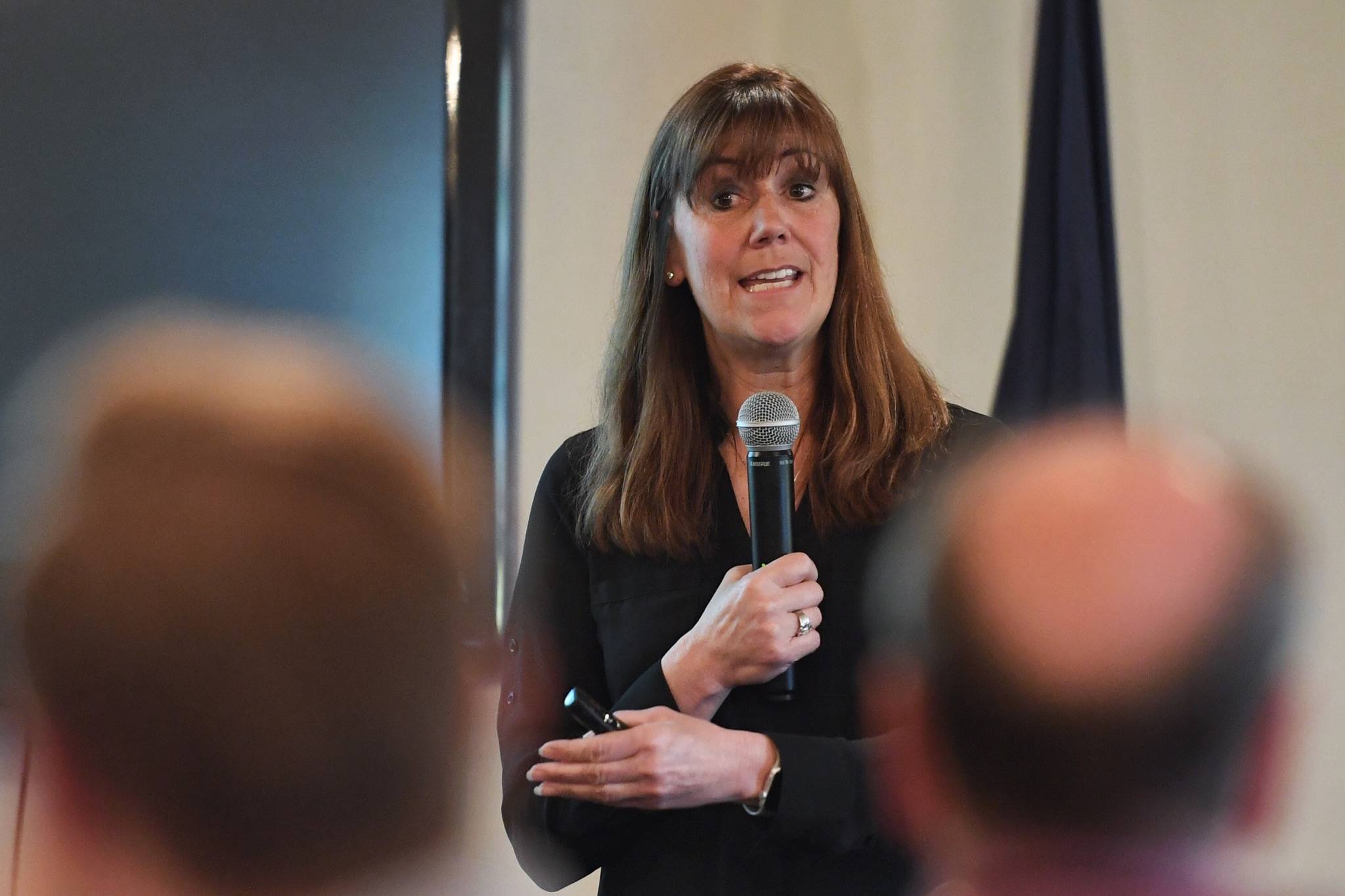Juneau School District Superintendent Bridget Weiss’s presentation to the Juneau Chamber of Commerce was mostly cheerful, but some concerns about state funding crept into the discussion.
Weiss was asked Thursday during a chamber luncheon to assess how arts education is going in the district, and while she said a partnership with Juneau Arts & Humanities Council and teachers who value the arts help the cause, she has budgetary concerns that could be realized in the near future.
“When you look at our budget potential cliff, that worries me because arts is one of many programs that — I don’t know how we would craft a plan at a 26-percent cut,” Weiss said. “Just like I don’t know how our state is going to be successful with a lack of social and emotional supports, or Southeast without the ferry system, the university system. We’re getting hit in all directions, and kids are going to get hurt. We don’t have the resources to buffer that and give kids what they need.”
[Property tax bills could be going up]
That prompted a question about whether consolidating schools in an attempt to save money has been considered.
“The board has had multiple conversations about consolidation, and what that would mean, what we would gain and what we would lose,” Weiss said. “Again to that cliff, I don’t think there’s anything we wouldn’t have to look at. As we exist now, the school board hasn’t made any decisions about closing a school. We would take those decisions very thoughtfully and a step at the time.”
However, much of the content of Weiss’ remarks before and after the presentation were less gloomy.
She was positive after her presentation when discussing recent developments in negotiations between the district and two negotiating units, Juneau Education Association and Juneau Education Support Staff.
A tentative agreement with JESS was given a first reading Tuesday night, a tentative agreement with JEA is expected to be shared May 17 and a ratification vote for JEA members is anticipated for May 22, according to a school district press release.
“It’s really nice to know we’ll have good, solid contracts with both groups,” Weiss said.
Weiss was also fairly upbeat when discussing student achievement.
That did result in a question about how the district’s seemingly low Performance Evaluation for Alaska’s Schools (PEAKS) scores compare to the rest of the nation. The scores show 12.71 percent of students testing at an advanced level in English and language arts and 35.5 percent of students testing at a proficient level.
PEAKS scores are an Alaska-specific standardized test, so national comparisons aren’t possible, Weiss said, but she said the district does compare favorably to the state and other cities.
About 5 percent more Juneau students tested at either advanced or proficient levels in English and language arts than the state average, according to test results. Juneau schools also compare favorably to Anchorage schools in the subject by a narrow margin — 12.71 percent advanced for Juneau compared to 11.48 for Anchorage and 35.5 percent proficient compared to 34.16 for Anchorage.
“It’s a very finite measure, it’s a very public measure, and it’s a mandated measure, but it is one,” Weiss said.
She said encouraging graduation rates — over 90 percent for Juneau’s two comprehensive high schools and about 83 percent when the alternative high school is included — are metrics that also help create an accurate picture of student achievement.
[Tire-d of dangerous senior pranks? You’ll like this one]
Earlier, Weiss also mentioned three Juneau School District students are National Merit finalists this year. National Merit Scholarship Corporation is a nonprofit that honors academic achievement and provides scholarships.
About 15,000 students out of 1.5 million high school students become finalists, Weiss said. This year that total includes two students are Thunder Mountain High School students and one is a Juneau-Douglas High School: Yadaa.at Kalé.
She also said the school regularly excels in science assessments — almost 56 percent of tested Juneau students tested at proficient or advanced levels compared to about 47 percent in the state.
Weiss chalked up those strong showings to the Science Technology Engineering and Math Community Group, which leads to STEM community nights and guest speakers in classrooms.
She said given that STEM is an integrated subject matter, it’s hoped those results will spread to other subjects.
• Contact reporter Ben Hohenstatt at (907)523-2243 or bhohenstatt@juneauempire.com. Follow him on Twitter at @BenHohenstatt.

